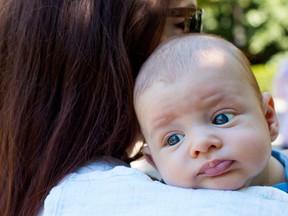World
Emma Raducanu Sparks Debate on Babies at Public Events

During a tense moment at the recent U.S. Open, British tennis player Emma Raducanu addressed a unique distraction: a crying baby in the crowd. As she struggled against the world number one, Raducanu turned to the chair umpire, saying, “It’s been like ten minutes,” noting the interruption to her concentration. The umpire’s rhetorical response, “Do you want me to send a child out of the stadium?” elicited laughter from the audience, showcasing a growing frustration with the presence of young children at serious sporting events.
This incident highlights an ongoing debate about the appropriateness of bringing infants to public venues traditionally not designed for them. In the wake of Raducanu’s comments, reactions from the public and commentators have varied widely, reflecting differing views on parenting and public etiquette.
In a recent talk show, English sports commentator Simon Jordan described parents who bring babies to such events as “irresponsible morons,” arguing that it disrupts the experience for others. He clarified that his stance is not rooted in a dislike of children but rather a belief that certain public settings should remain child-free.
The discontent surrounding babies in public spaces is not new. Throughout history, etiquette experts have grappled with the challenge of balancing the needs of parents and the comfort of others. Notably, the late Emily Post emphasized in her timeless etiquette guide that children can and should be taught manners from a young age. Her great-granddaughter-in-law continues this legacy, advocating for the importance of instilling good behavior in children.
In contrast, some modern parents, like writer Rebecca Eckler, argue against the harsh criticism directed at those bringing babies into public spaces. Eckler, who has written extensively on motherhood, suggests that the societal backlash against infants in restaurants, planes, and theatres often oversimplifies the challenges faced by parents.
“Flying is already a misery. If a baby cries while I’m sipping mediocre coffee, that’s not the end of civilization,” Eckler stated. She believes that rather than focusing on the inconvenience of a crying child, we should consider the broader context of public spaces and the diverse experiences of families.
The discussion extends beyond mere annoyance. Concerns about the well-being of infants in loud environments have also emerged. Colombian artist Maluma recently voiced his apprehension during a concert in Mexico City, questioning the appropriateness of bringing a baby to such a loud venue. He urged parents to protect their child’s ears, highlighting the potential risks associated with exposing infants to loud music.
The emergence of social media has further amplified these debates, allowing public opinions to spread rapidly. Once, a person dissatisfied with a child’s behavior might have quietly expressed their annoyance; now, these sentiments can explode into viral discussions. This shift has complicated the conversation, making it less about individual experiences and more about societal norms regarding parenting.
Etiquette expert Elaine Swann offers a nuanced perspective on the matter. She asserts that manners fundamentally revolve around putting others at ease. “It’s about being mindful of the environment and how our actions may affect those around us,” Swann explained. She acknowledged that while some parents may be unaware of their child’s disruptive behavior, others may simply be prioritizing their own needs over the comfort of others.
The debate raises an important question: when is it appropriate to bring babies into certain public spaces? While the presence of infants can sometimes be annoying, Swann believes the conversation should focus on the behavior of the parents rather than the children themselves.
As public venues continue to navigate the balance between inclusion and comfort, the call for mindful parenting in shared spaces remains relevant. The incident at the U.S. Open serves as a reminder that societal attitudes toward children in public are evolving, and with that evolution comes a need for ongoing discussion and understanding.
In recent years, there have been efforts to make public spaces more accommodating for families. Many venues have introduced facilities such as nursing rooms and family-friendly areas, and there have been increasing discussions around the acceptance of breastfeeding in public.
Nonetheless, challenges persist. For instance, Virgin Australia recently faced backlash after asking a woman to stop pumping breast milk in a lounge, demonstrating that some establishments are still catching up with modern parenting needs.
Ultimately, the discourse surrounding babies in public spaces reflects broader societal changes regarding parenting and community expectations. As families continue to navigate these challenges, it is crucial to foster an environment of understanding and respect for diverse parenting choices, ensuring that public spaces remain welcoming for all.
-

 World3 months ago
World3 months agoScientists Unearth Ancient Antarctic Ice to Unlock Climate Secrets
-

 Entertainment3 months ago
Entertainment3 months agoTrump and McCormick to Announce $70 Billion Energy Investments
-

 Science3 months ago
Science3 months agoFour Astronauts Return to Earth After International Space Station Mission
-

 Lifestyle3 months ago
Lifestyle3 months agoTransLink Launches Food Truck Program to Boost Revenue in Vancouver
-

 Technology2 months ago
Technology2 months agoApple Notes Enhances Functionality with Markdown Support in macOS 26
-

 Top Stories1 week ago
Top Stories1 week agoUrgent Update: Fatal Crash on Highway 99 Claims Life of Pitt Meadows Man
-

 Sports3 months ago
Sports3 months agoSearch Underway for Missing Hunter Amid Hokkaido Bear Emergency
-

 Politics2 months ago
Politics2 months agoUkrainian Tennis Star Elina Svitolina Faces Death Threats Online
-

 Technology3 months ago
Technology3 months agoFrosthaven Launches Early Access on July 31, 2025
-

 Politics3 months ago
Politics3 months agoCarney Engages First Nations Leaders at Development Law Summit
-

 Entertainment3 months ago
Entertainment3 months agoCalgary Theatre Troupe Revives Magic at Winnipeg Fringe Festival
-

 Politics1 week ago
Politics1 week agoShutdown Reflects Democratic Struggles Amid Economic Concerns





















